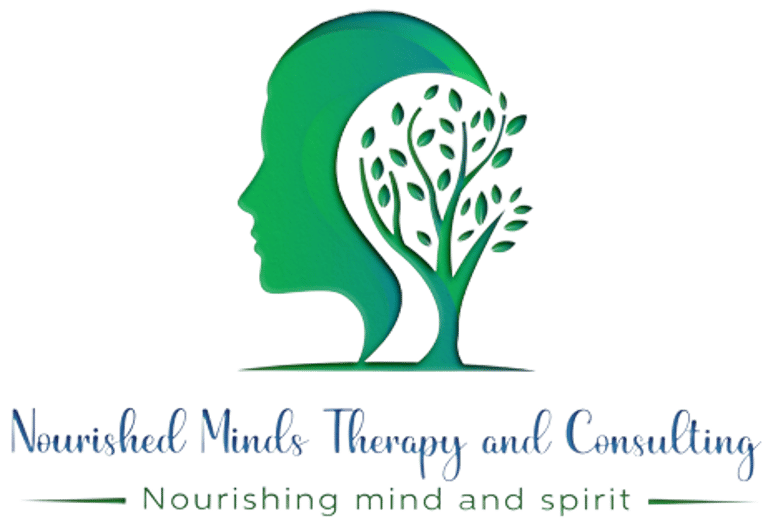


If you’ve followed this 4 part blog series thus far, you may be realizing that you or someone you care about are trapped in the diet culture cycle of restriction, guilt, and shame when it comes to food and the body. I am happy to tell you there are gentle and liberating alternatives that prioritize mental and physical well-being over arbitrary rules and unrealistic expectations – and best of all, they are NOT another diet or wellness program! In this final post of the What’s Eating You series, I am going to share with you some specific principles derived from mindfulness, Intuitive Eating, and Acceptance and Commitment therapy that are empirically validated and sustainable ways to truly improve your health both inside and out.
Intuitive Eating: Rejecting the Diet Mentality
Intuitive Eating is a comprehensive approach to improving your relationship with food and your body. Below, I will share a snap shot of a few principles of Intuitive Eating that are great starting points in your journey. If you are interested in learning about Intuitive Eating in its totality, you can find more information on my website here (Intuitive Eating) and consultations of how Nourished Minds Therapy can assist you with becoming an intuitive eater are always free, and can be scheduled here (Consultation Request).
In Intuitive Eating, the first step is to let go of the pervasive diet mentality that permeates our culture. Intuitive Eating rests on the premise that we should take our cues for eating internally instead of externally. If we start Intuitive Eating with the mindset of, “I’ll do this so I can fit into my dress for my friend’s wedding,” or “My doctor told me I have to lose weight,” then we have already lost the battle, are motivated by external reasons (i.e., not intuitive) and are just starting another diet. Learning to tune back into our body’s signals for hunger, satiety, and fullness have to come from within. Diet culture thrives on the belief that certain foods are inherently "good" or "bad," and that our worth is tied to our ability to adhere to rigid eating plans and achieve a specific body size or shape. As you have learned, this mindset only serves to perpetuate feelings of guilt, shame, and inadequacy, and induce stress, weight cycling, and a host of other issues.
Intuitive eating invites us to challenge these harmful beliefs and trust in our body's innate wisdom. By honoring our hunger and giving ourselves unconditional permission to eat, we can get off the hamster wheel of deprivation and guilt, and have a more peaceful and sustainable relationship with food.
Honoring Hunger and Eating Foods You Truly Enjoy
Central to intuitive eating is the principle of honoring our hunger and nourishing ourselves with foods that bring us joy and satisfaction. Unlike traditional diets that prescribe strict meal plans and food rules, intuitive eating empowers us to listen to our body's cravings and preferences, and eat in a way that feels both nourishing and pleasurable.
This means giving ourselves permission to enjoy all foods without guilt or shame, whether it's a crisp salad or a slice of pizza. By allowing ourselves to savor the foods we love, we can gain a deeper sense of satisfaction and fulfillment, and move away from the cycle of emotional eating or bingeing that often accompanies restrictive dieting. If your initial reaction to this principle is, “But wait, won’t I just sit around eating potato chips and candy all day if I have permission to eat the foods I love?” pause and consider how far diet culture shame may have taken you from your ability to trust your body. A baby does not overindulge on milk; she knows when she's done and can let her parents know this by turning away or spitting the milk out if parents miss her fullness cues. She can also let them know when she is feeling hungry again. Sadly, somewhere along the line, many of us are taught to stop trusting our body’s natural inner signals by being told we “have to finish every bite” (even if we are full), or “you can’t have that, you’ll get too big,” even though we are still hungry. And so the cycle of overeating, undereating, or eating for reasons other than truly wanting/needing to eat begins. Intuitive eating helps bring us back to our innate sensibilities, all while bringing the joy back into meal time!
Coping with Emotions with Kindness
Sometimes, we may turn to food not so much because we are hungry, craving a nutrient, or wanting to eat at the moment, but as a way to cope with difficult emotions such as stress, anxiety, or sadness. Other times, we may be eating to distract ourselves from other stressors in our lives. However, intuitive eating encourages us to develop alternative coping strategies that support our mental and emotional well-being without relying on food as a crutch.
One powerful way to cope with emotions is through practicing self-compassion. Rather than judging ourselves harshly or berating ourselves for eating, we can offer ourselves the same care and understanding that we would offer to a dear friend. This might involve practicing grounding techniques such as deep breathing or meditation, engaging in activities that bring us joy and relaxation, or seeking support from a therapist or counselor.
Positive affirmations and appreciative statements are wonderful forms of self-compassion. Instead of criticizing ourselves for our perceived flaws or shortcomings, intuitive eating encourages us to celebrate our bodies for all they do for us. Positive affirmations are positive statements that affirm our worth and value as individuals. These affirmations can be tailored to your own unique experiences and struggles, and might include statements such as, "I am worthy of love and respect exactly as I am," or "I am grateful for all that my body allows me to do." “This body I am in is my home—it is with me wherever I go, and is deserving of care.”
By repeating these affirmations regularly, we can begin to rewire our brains and initiate a more positive and compassionate relationship with our bodies. As we learn to treat ourselves with kindness and respect, we naturally gravitate towards behaviors that support our overall health and well-being, and embrace a more intuitive and mindful approach to eating and living.
Mindfulness Strategies and Interoceptive Awareness
At the heart of intuitive eating lies the practice of mindfulness – the art of paying attention to the present moment with openness and curiosity. Mindfulness techniques such as journaling, body scans, and mindful eating can help us gain greater awareness of our thoughts, feelings, and sensations, and develop a more compassionate and attuned relationship with our bodies.
Interoceptive awareness, a powerful ally in our mindfulness journey, is the ability to be aware of internal sensations in the body, including heart rate, respiration, hunger, fullness, temperature, and pain, as well as emotion sensations, and respond to those needs appropriately. Sensations ranging from a small craving to emotional discomfort are noticed rather than dismissed, and responded to with curiosity and compassion. Someone with high interoceptive awareness is likely to eat when they feel hungry, rest or take a break if they feel overwhelmed, breath deeply if their heart rate accelerates, and so on. Someone with low interoceptive awareness may go all day without eating, ignore (or not notice) pain in their leg until it is unbearable, or perhaps respond with short temperedness when they are feeling anxiety or sadness.
To increase awareness, before each meal or snack, take a few moments to check in with your body. Notice any sensations of hunger or fullness, as well as any emotions or thoughts that arise. As you eat, pay attention to the taste, texture, and aroma of each bite, and pause periodically to check in with your hunger and fullness levels. By bringing mindfulness to our eating habits, we can create a more attuned connection with our bodies and obtain a greater sense of satisfaction and well-being.
ACT and Thought Defusion
Acceptance and Commitment Therapy (ACT) offers valuable tools and techniques for unhooking from negative thoughts and beliefs surrounding dieting and body image. At its core, ACT encourages individuals to increase psychological flexibility – the ability to adapt to life's challenges with openness, mindfulness, and values-driven action. One key principle of ACT is cognitive defusion, which involves creating distance from our thoughts and recognizing them as transient mental events rather than absolute truths. When it comes to negative thoughts about dieting and the body, cognitive defusion can help us detach from harmful beliefs and narratives that contribute to feelings of shame and inadequacy. For example, rather than automatically believing the thought "I'm not good enough because I don't have the 'perfect' body," we can practice cognitive defusion by saying to ourselves, "I notice that I'm having the thought that I'm not good enough because of my body." By recognizing our thoughts as passing mental events, we can begin to loosen their grip on our self-esteem and sense of worth.
Values clarification is another key aspect of ACT that can support us in unhooking from negative thoughts about dieting and the body. Values clarification involves identifying what truly matters to us in life – our core values and priorities – and taking committed action in alignment with those values. When it comes to our relationship with food and our bodies, values clarification can help us shift our focus from external appearance or weight loss goals to internal qualities and experiences that bring us true fulfillment and happiness. For example, rather than pursuing a restrictive diet in the pursuit of a certain body shape, we can identify values such as health, vitality, and self-care, or quality time with family and take action that nourishes our bodies and supports our overall well-being. By aligning our actions with our values, we gain a greater sense of purpose and authenticity, and break free from the cycle of dieting and body dissatisfaction.
Conclusion:
The strategies discussed in this blog offer powerful antidotes to the toxic diet culture that pervades our society. Rejecting the diet mentality, honoring our body’s natural cues, and engaging in mindfulness and self-compassion are some wonderful ways we can holistically support our mental and physical health, and foster a deeper sense of peace and well-being. As we learn to listen to our body's internal wisdom and embrace our inherent worth and value, we can reclaim our autonomy and live a life of true authenticity, joy, and vitality.
As discussed in several of my posts, remember to be intentional about the company you keep and the level of support (or lack thereof) that you receive from them. If you are noticing there is a lot of time spent with people who reinforce negative messages about your health, your body, and your self-image, you may need to consider setting boundaries and seeking connections with others who are going to encourage and motivate you. If you find you are in need of professional support, Nourished Minds Therapy can work with you to further enhance your journey of healing. Whatever decision you make, wherever you are on your path, and whatever body you are in, know you AND your body are so worthy of respect and well-being!







